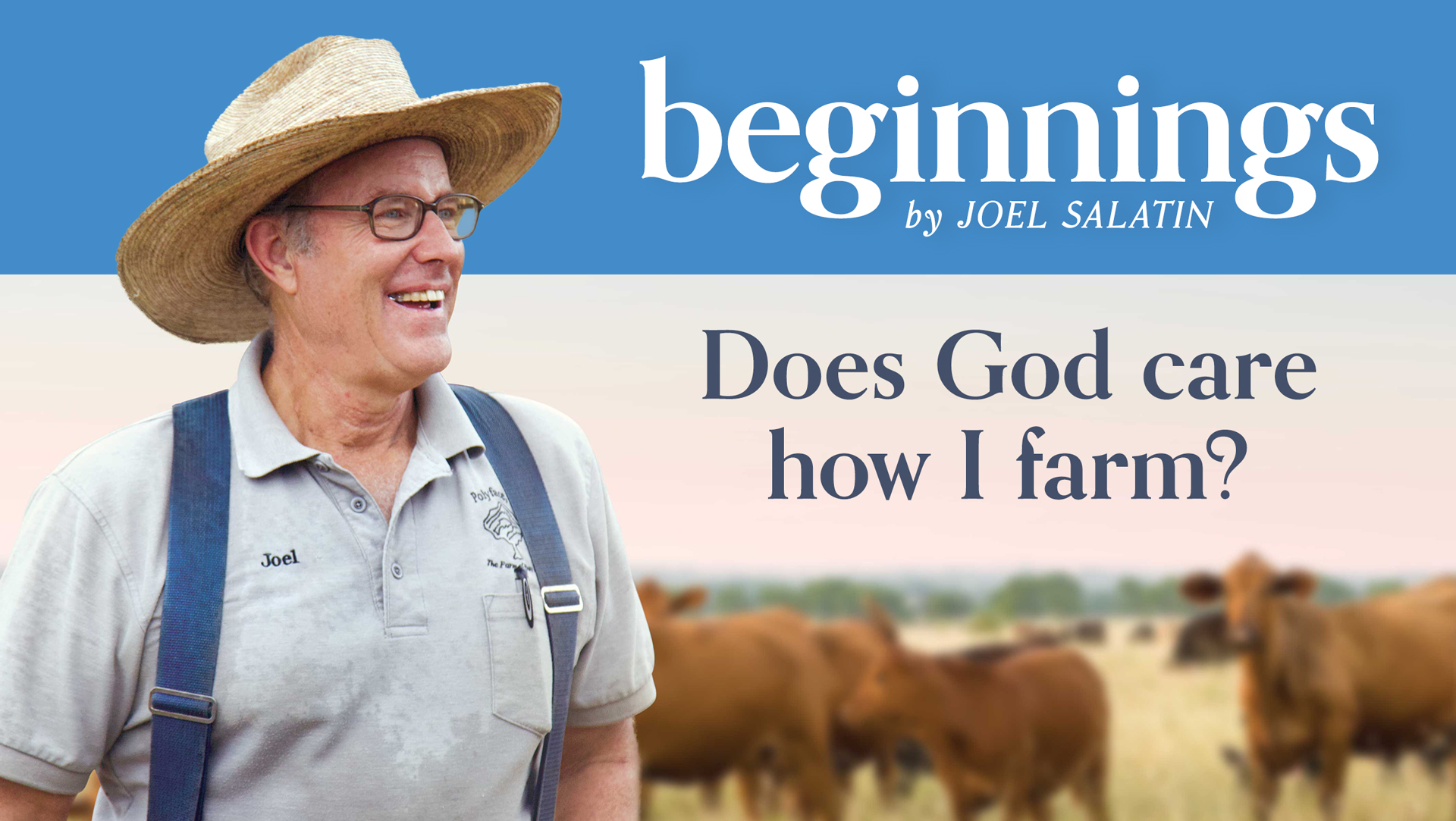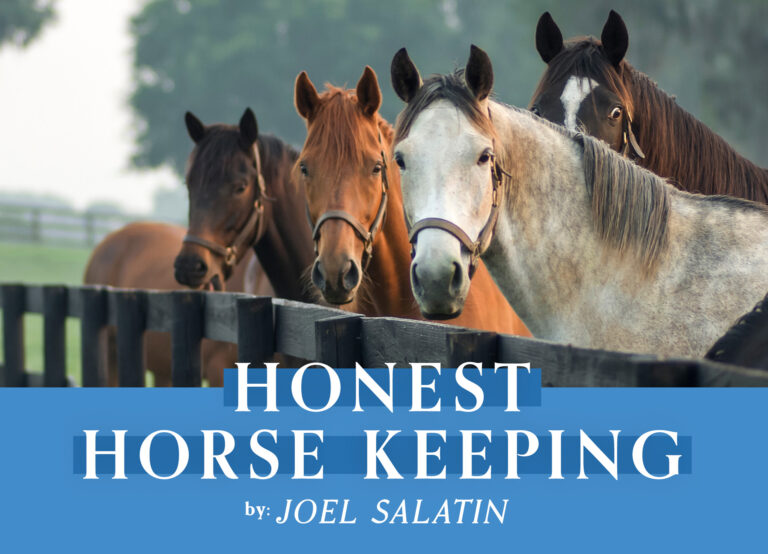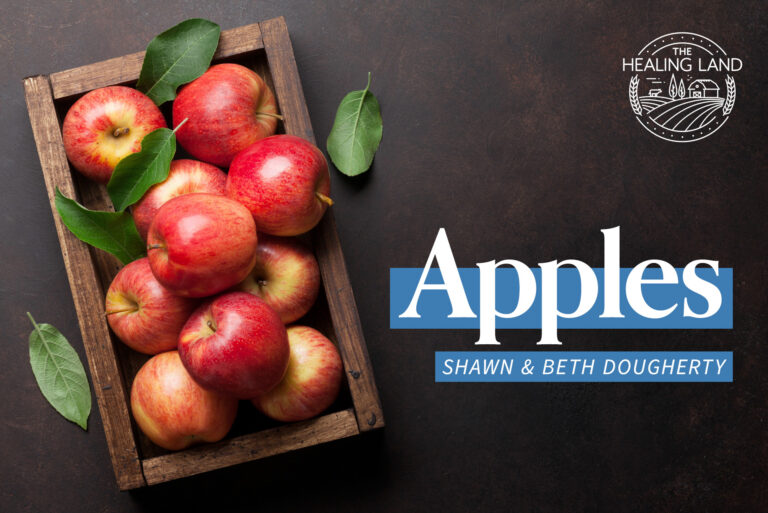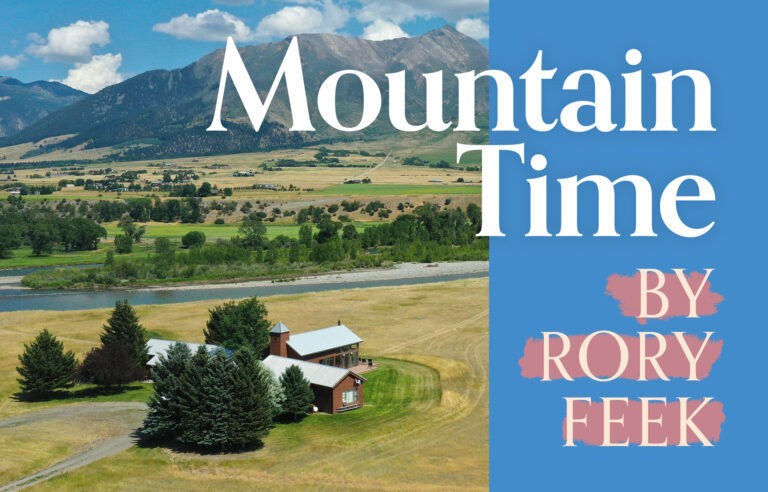By Joel Salatin, Plain Values
Does God Care How I Farm? That question defines my life’s work and vision because it moves the visceral, practical decisions I make in my farming vocation to a place of sacredness and godly living. If God cares about physical and practical things in my life, then my theology and belief structure are more than academic pursuits.
They are not just discussion groups and conversations. If God cares how I farm, then I should enthusiastically embrace searching for techniques and protocols that please Him. After all, it’s all His stuff. The courthouse may say I own this land, but ultimately I don’t. Legally and culturally, I may advocate for property rights, but really it’s all God’s property. Does He care how it’s handled? Does He care how I leave it? Does He care what I do with it?
By extension, does God care what my farm looks like on someone’s plate? Does He care if my corn goes into factory-farmed chickens, high fructose corn syrup, or pastured pigs? Indeed, does what I believe in the pew show up on my menu? Does stinking up the neighborhood or polluting the water with lagoon run-off and chemical fertilizer adhere to the Golden Rule? If I owned North America, would Ibe pleased with a dead zone the size of Rhode Island in the Gulf of Mexico?
My dad’s father wanted to be a farmer, but during the Depression he could not get a toehold. So he spent his life growing a massive garden and tinkering in his Indiana basement workshop. Post World War II, he became a charter subscriber to J.I. Rodale’s Organic Gardening and Farming Magazine. That magazine launched the Rodale publishing house and extolled a biological approach to food production at a time when the chemical approach was not yet firmly embedded in our nation’s psyche.
My dad wanted to farm but needed a nest egg. Already seeing the socialistic tendencies in the U.S. following World War II, where he flew in the Navy, he received a business degree on the GI bill, spent a year learning Spanish, then was hired on as a bilingual accountant for Texas Oil Company (later Texaco) serving the early oil development off of the coast of Venezuela. He saw South America as a new frontier, with plentiful cheap land and open markets. What better place to farm?
He married Mom (an Ohioan) and in just seven years saved enough to purchase a 1,000-acre highland Venezuela farm. Our family, which by 1957 included my older brother and me, moved to the farm and began raising chickens. But alas, by 1959 political unrest enveloped the country, and our family became targets for the revolution that eventually unseated Peres Jimenez from power. Unable to procure protection, we fled and eventually returned to the U.S. on Easter Sunday 1961.
Dad left his heart and soul in Venezuela; he loved the culture, the people, the climate. Who wouldn’t like a place where bananas, pineapples, and papayas grow wild? He hoped that once things settled down, we’d be able to go back; so rather than return to his midwestern roots, he looked at places within a day’s drive of Washington D.C. in case the Venezuelan embassy called. Our family looked at properties from Lancaster, Pennsylvania, down through the Shenandoah Valley of Virginia, and as far south as Raleigh, North Carolina.
The embassy did not call. But we found a cheap place in Swoope, Virginia: a gullied rockpile that looked like the badlands rather than good land. Did I say it was cheap? We moved in during July 1961, and Dad immediately asked both public and private agricultural experts how to make a living on this 550-acre farm. All advisors agreed that we should graze the forest, plant corn, borrow more money, build silos, and buy chemical fertilizers.
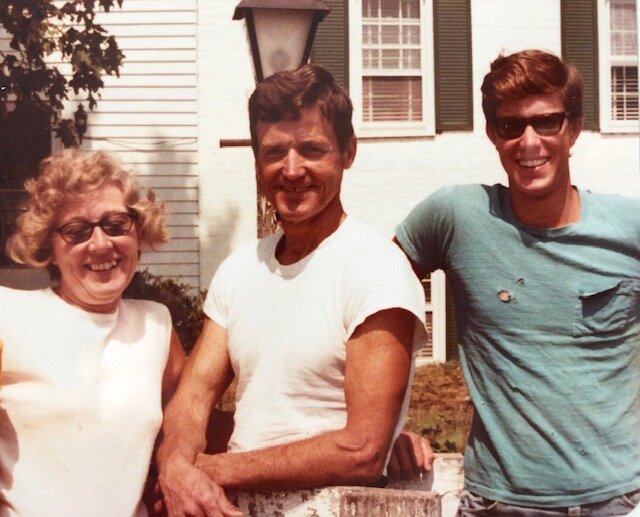
My dad saw all this as a trap, a rat race, a chemical addiction. His dad (my grandfather) avidly promoted compost rather than chemicals. With three children to support (my sister was bornlate in 1961) and a mortgage to pay, he and Mom decided they couldn’t make it without outside income. Mom taught high school health and physical education, and Dad was hired on as an accountant with a local firm.
On the side, he began experimenting on the farm, which was where his heart was. I’m now at the age where the older I get, the more I realize how smart and forward-thinking Dad really was. One of my most poignant childhood memories was a Sunday afternoon drive to visit a farmer who built mobile shelters. I can’t remember what animal that farmer raised, but what I do remember is Dad’s enthusiasm at the notion of mobile shelters.
Meanwhile, he began reading about rotational grazing. The terms mob grazing, high-density grazing, or management-intensive grazing had not yet been invented. Andre Voisin, author of Grass Productivity (still the iconic textbook in the grass farming movement), called it rational grazing (like rationing out the forage). In any case, Dad found this material early on and immediately began designing mobile electric fencing. Energizers were extremely primitive in those days.
By the mid-1960s, he had a functional system, and we began moving the cows every couple of weeks. We planted about 60 acres of gullied steep hillsides in pine trees to stop the erosion and get some ground cover. That reduced the open land from 160 acres down to about 90 acres, with the balance in Appalachian hardwoods with no access. My older brother wanted to raise rabbits, and we built a mobile rabbit hutch with outlying runs like wings on an airplane.
After trying numerous ideas to keep the rabbits from digging out and escaping, we abandoned the pastured rabbit idea. Not wanting to discard something that could prove useful in a future iteration, we pulled those rabbit runs up in the rafters of the barn for safekeeping. A couple of years later, my fledgling laying hen enterprise (I got my first ones when I was 10) outgrew our little chicken coop behind the yard, and Dad suggested we pull those old rabbit runs down out of the rafters and put my chickens in them.
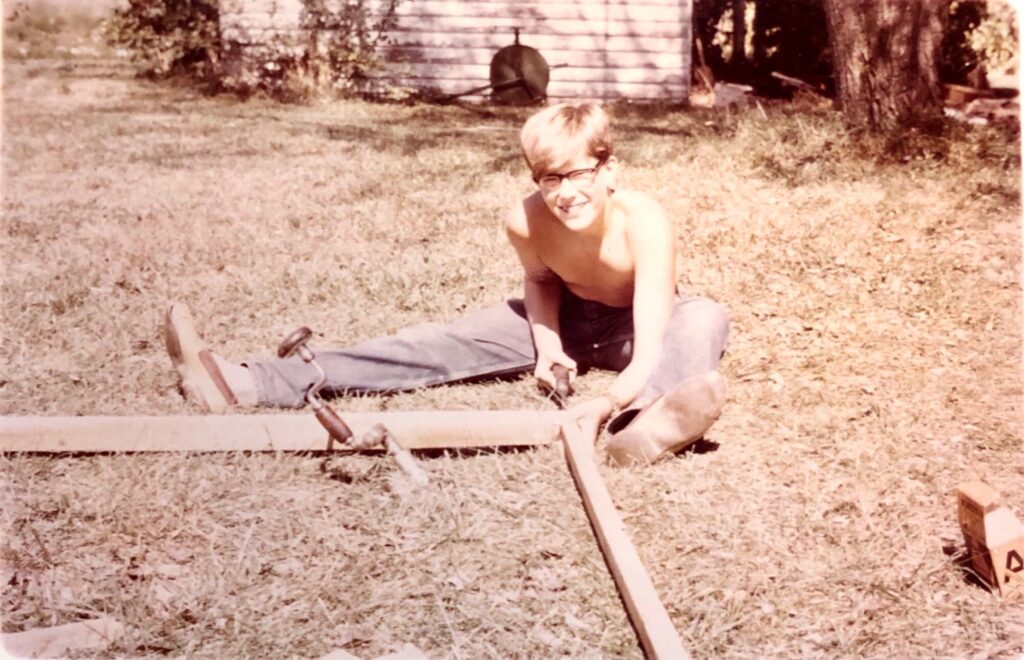
With a bit of retrofitting, that worked superbly and birthed pastured poultry on our farm. With both Dad and Mom working full-time town jobs, our farm was an oversized homestead. We could only keep about 15 cows due to low fertility. When I began raking hay at about 13 years old, I would put 16 swaths together to make one anemic windrow. I could walk the whole farm and never set foot on a piece of vegetation; that’s how much bare ground existed. Visitors would have thought we were raising thistles as a crop.
We always milked a couple of cows by hand, churned our own butter, made our own yoghurt and cottage cheese, and when I was about 13, began selling at the local curb market. It was a Depression-era farmers’ market that enjoyed food safety exemptions if vendors were members of agricultural extension service programs. I joined 4-H to qualify, which enabled us to sell uninspected meat, milk products, cooked chicken, and field-slaughtered and home-processed beef and pork. Every Saturday of the year, from the time I was about 14 until I finished high school at 18, I got up at 4 a.m. to be down at the market at 6 a.m.
This period of time spanned 1970-1975; Vietnam; Woodstock; hippies. Looking back, I realize we were about a decade or maybe two ahead of our time. But we had loyal customers, gained invaluable marketing experience, and most of all realized the advantages of selling directly to retail customers. Wearing the processing, marketing, and distribution “middle-man” hats in addition to the production hat enabled even an extremely small farm to make a living.
The conversation that set the stage for the rest of my life occurred one morning with Dad out on the farm lane beyond the barn. One of his accounting clients was a realtor and, always on the quest for another property to list, queried Dad about selling. “You could sell this place for $500,000 and buy triple the acreage in Arkansas or Missouri,” he said. Dad, always the innovator and ready for the next big thing, did not dismiss the idea, and I got wind that he was pondering over it. I approached him on that farm lane one morning to confirm if I’d heard correctly. He asked me if I truly wanted the farm for my life’s vocation (neither my sister nor brother were interested in farming), and I said I did. He promised to never consider selling again, and he never did.
From that moment on, my mind was consumed with how to make a living on this little farm. With only 90 acres of pasture and no access to the rest of it, how could I make a living? This was during the Nixon administration and the Watergate debacle. A junior in high school at the time, I worked Saturday nights at the local newspaper, writing police reports, obituaries, and other spot news items. I loved writing. As early as 9 years old, I would write fiction stories in spiral notebooks just for fun. We never had a TV (still don’t), and this was part of my entertainment. I knew I had a flair for writing, speaking, and communication in general.
Why not become a journalist, write a bestseller, and then return to the farm with royalties? That seemed like a good path, so I headed to college since that’s what smart kids are supposed to do, got an English degree, and returned to the newspaper, living at home and working in town. Teresa and I married, fixed up the attic in the old farmhouse (we called it our penthouse), drove a $50 car, only ate what we grew in the garden, and saved every penny. Within a couple of years, we’d saved enough to live on for a year.
I resigned from the newspaper job and came home, assuming our little nest egg would run out in a year. But it never did. It was like the widow’s cruse of oil; things were tight but we survived, direct marketing to local customers, starting back into broiler chickens, selling firewood, and living frugally. Today that has morphed into a $4 million farm business serving 6,000 families, 30 restaurants, numerous institutions, 20 paychecks, and four generations living on the farm.
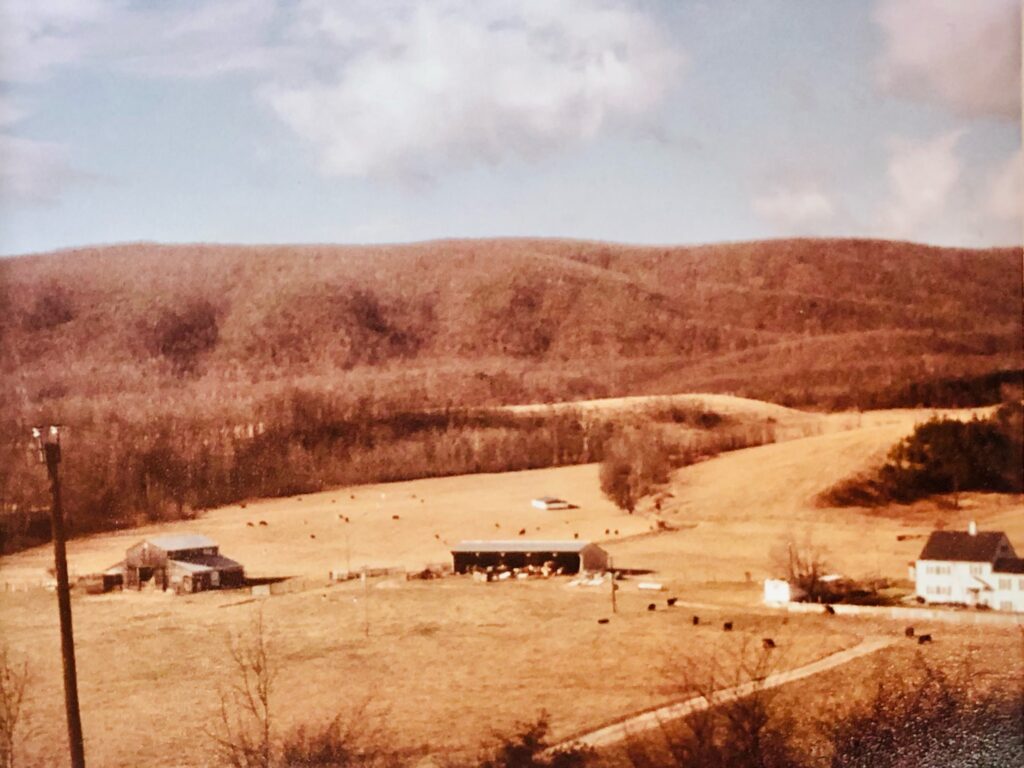
The farm has responded to our care. Those 100-bale fields now yield 1,200. Those scant windrows are now too big to step over. Eroded soils have built up a foot over bare rocks. To watch God’s abundance manifest itself in such a profound way brings us to our knees in gratitude. Does God care? Yes. And when we embrace His techniques, He fills our barns a hundredfold. As a result, the farm is now an object lesson of divine mercy and grace. We love showing visitors what He has wrought through our hands, heads, and humility. It’s all God’s stuff.
This article was published in the September, 2021 issue of Plain Values Magazine. If you want the latest stories every month, subscribe to the magazine at plainvalues.com. As a special thanks, get 10% off your subscription with the code “GAB23”!
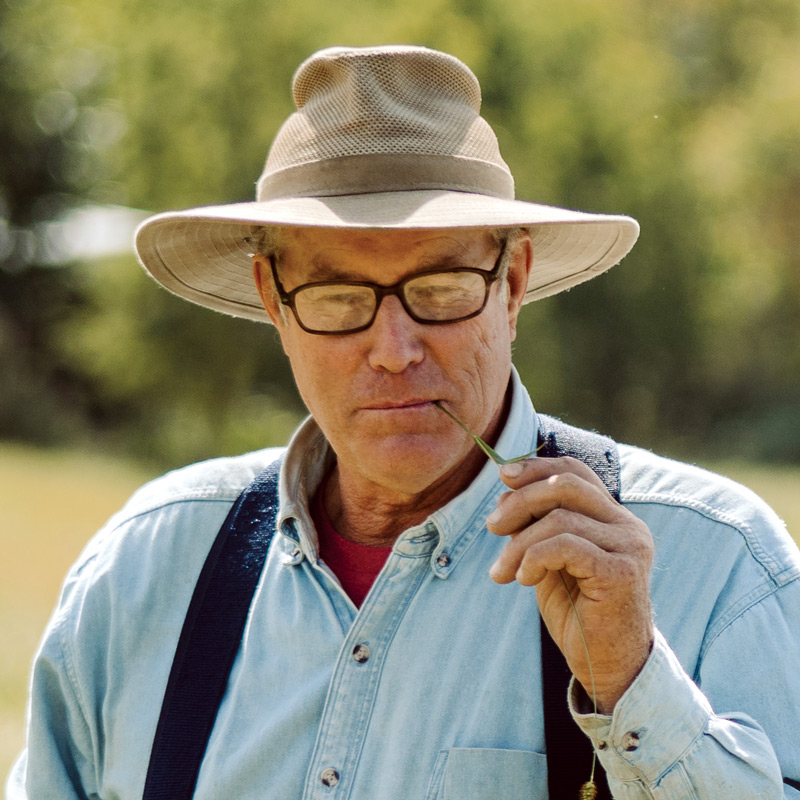
Joel co-owns, with his family, Polyface Farm in Swoope, Virginia. When he’s not on the road speaking, he’s at home on the farm, keeping the callouses on his hands and dirt under his fingernails, mentoring young people, inspiring visitors, and promoting local, regenerative food and farming systems.


